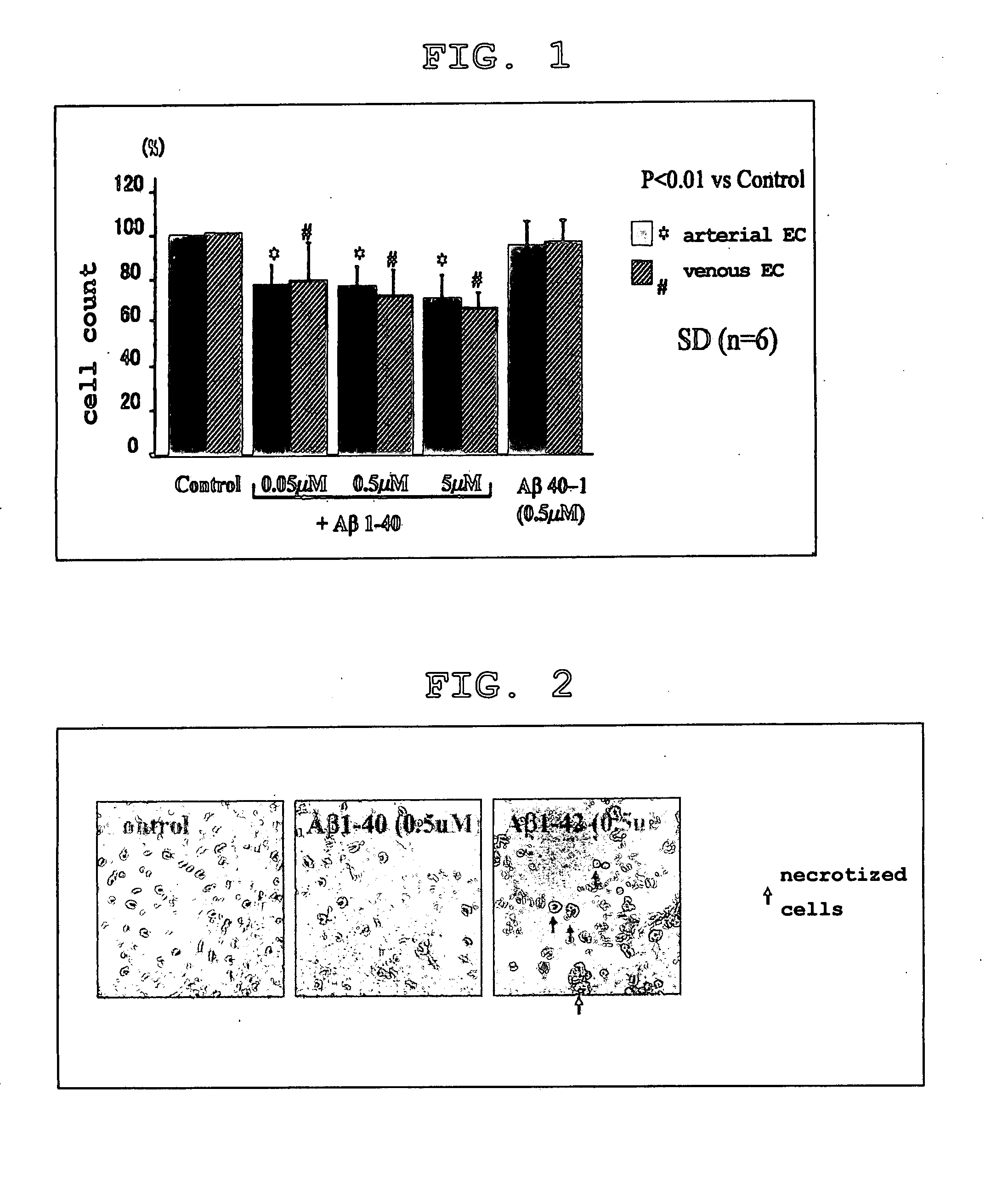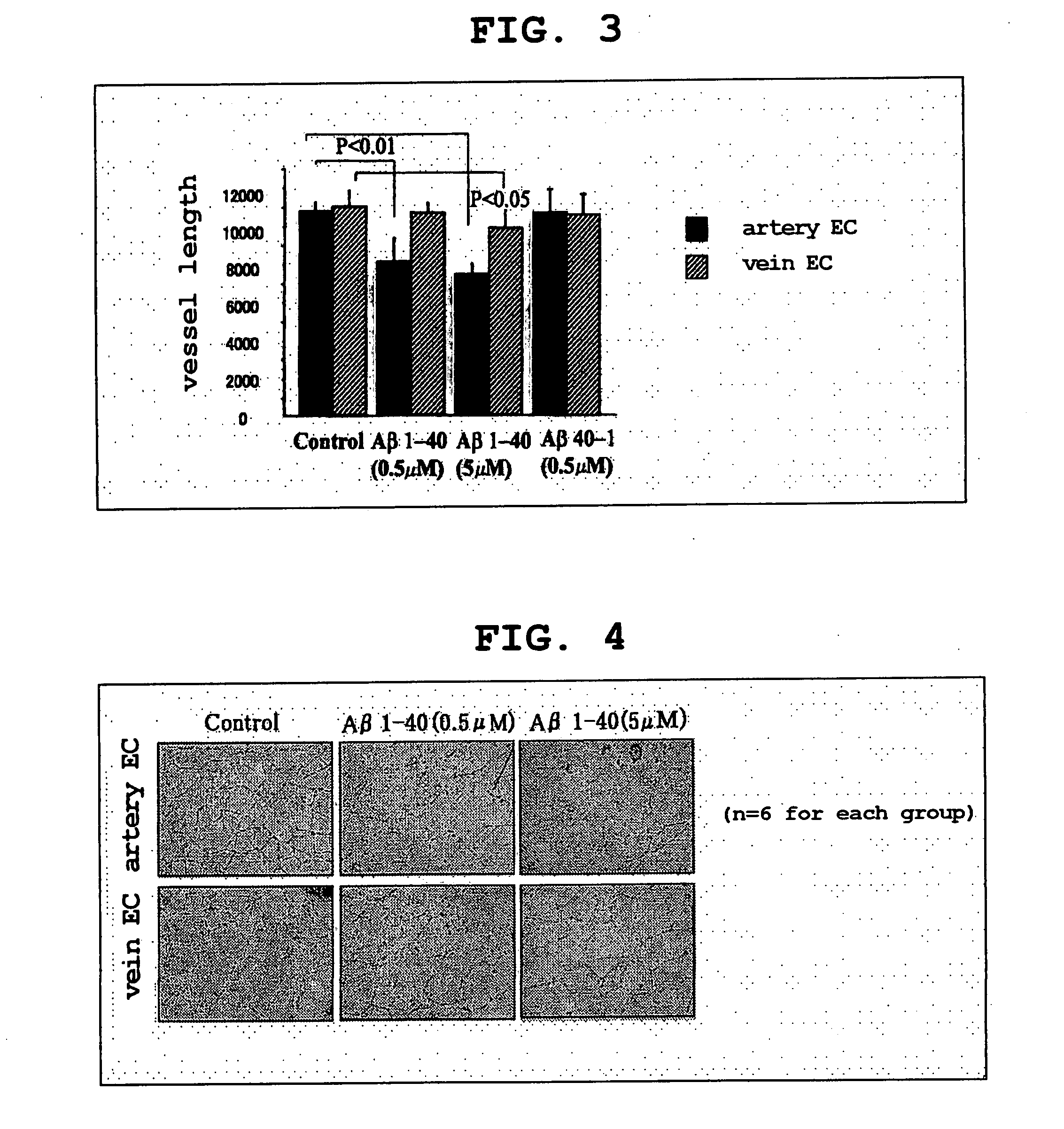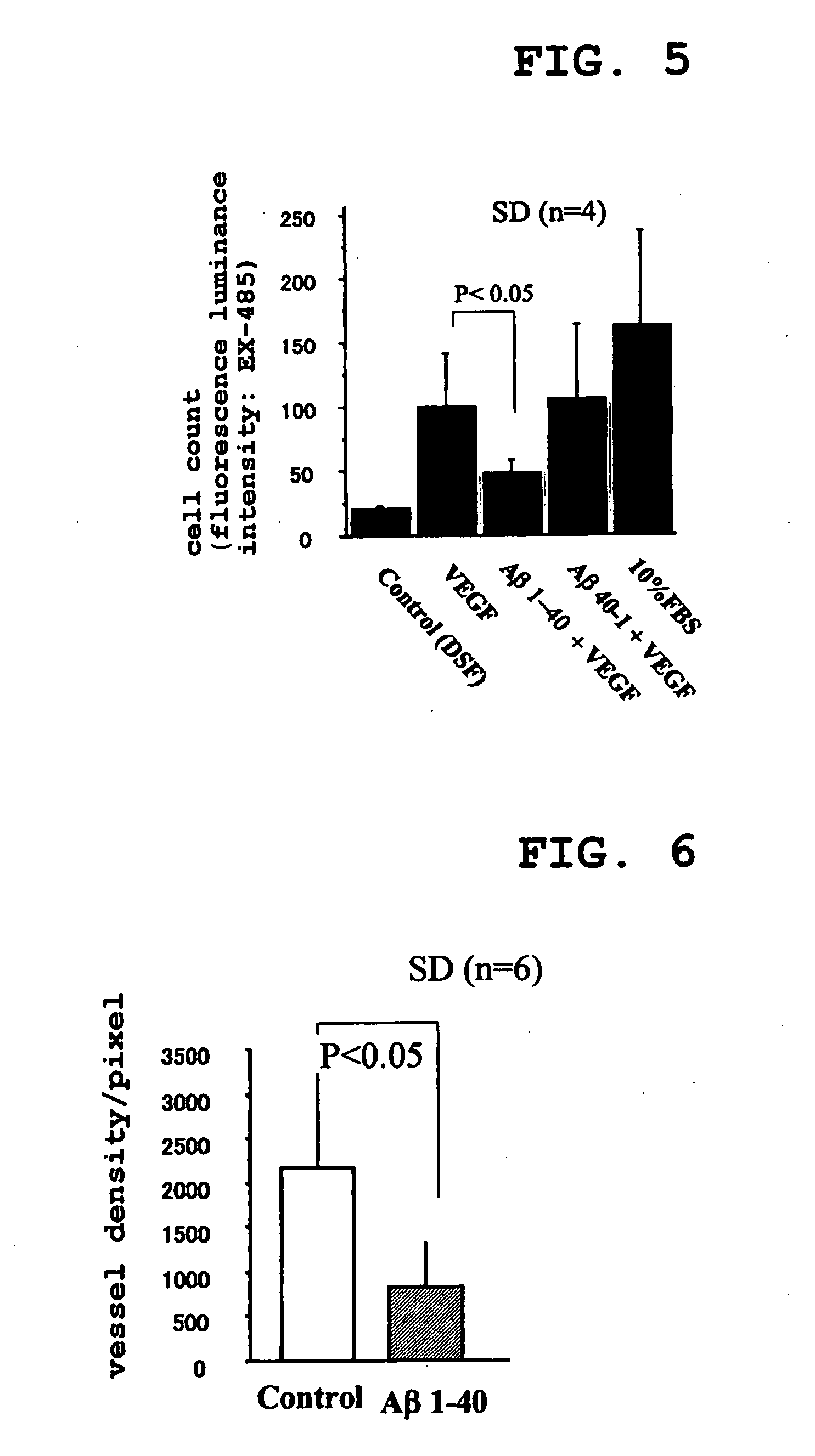Remedy for Alzheimer's Disease
a technology for alzheimer's and therapy, applied in the field of alzheimer's disease therapy, can solve the problems of reducing affecting the quality of life of people, and affecting the overall onset mechanism, so as to suppress the differentiation of vascular endothelial precursor cells, and promote vascularization
- Summary
- Abstract
- Description
- Claims
- Application Information
AI Technical Summary
Problems solved by technology
Method used
Image
Examples
example 1
[0169] Human brain microvascular endothelial cells (arterial and venous) cultured in a 12-well plate by the above-described method were stimulated with Aβ1-40 (0.05 μM, 0.5 μM and 5 μM), Aβ1-42 (0.5 μM), Aβ40-1 (0.5 μM), and control (no Aβ derivative added) for 72 hours. Aβ40-1 has the sequence reverse to that of Aβ1-40. This was used as the control peptide. Next, the number of cells was counted manually using a hemocytometer.
[0170] The results of this experiment are shown in Table 1, FIG. 1 and FIG. 2.
TABLE 1Artery endothelial cellsVenous endothelial cellsAβ1-4078 ± 9.481Aβ1-4080 ± 18.987(0.05 μm)(0.05 μm)Aβ1-4075 ± 8.011Aβ1-4073 ± 11.392(0.5 μm)(0.5 μm)Aβ1-4073 ± 11.699Aβ1-4070 ± 5.968(5 μm)(5 μm)Aβ40-197 ± 8.934Aβ40-199 ± 6.288(0.5 μm)(0.5 μm)
* Cell count (relative to control as 100)
[0171] It was found that Aβ1-40 suppressed the growth of human brain microvascular endothelial cells, whereas Aβ40-1 did not. This was more conspicuous in arteries. (FIG. 1)
[0172] Because necroti...
example 2
[0173] Human umbilical artery endothelial cells and human umbilical vein endothelial cells were stimulated with Aβ1-40 (0.5 μM and 5 μM), Aβ40-1 (0.5 μM), and control (no Aβ derivative added) for 72 hours; after reaching an 80% confluence, endothelial cells were then washed with PBS, trypsinated, and cultured on a 6-well culture plate coated with Matrigel basal membrane matrix (Becton Dickinson Labware) for 18 hours. The cells on the Matrigel were photographed, and the full-length was measured using an NIH image analyzer.
[0174] The results are shown in Table 2 and Table 3. The unit of measurement is in pixel.
TABLE 2Artery endothelial cellsNumber ofStandardStandardrowsMean valuedeviationerrorControl611530.333492.232200.953Aβ1-4068719.3331401.024571.966(0.5 μm)Aβ1-4067951.167634.222258.920(5 μm)Aβ40-1611863.677894.591365.215(0.5 μm)
[0175]
TABLE 3Vein endothelial cellsNumber ofStandardStandardrowsMean valuedeviationerrorControl610875.500844.251344.664Aβ1-40610599.000453.972185.333(0....
example 3
[0177] Next, endothelial cell migration was examined using Boyden chamber assay. Briefly, an EBM-2 medium comprising VEGF (10 ng / ml), Aβ1-40 (0.5 μM and 5 μM)+VEGF (10 ng / ml), Aβ40-1 (0.5 μM)+VEGF (10 ng / ml), 10% FBS or control (no Aβ derivative added) was placed in the lower section of a chamber. 5×104 endothelial cells (in 50 μL of EBM-2 supplemented with 0.5% bovine serum albumin) were seeded into the upper section of the chamber. Cell migration was measured by counting the cells in four highly magnified fields of vision (×40). Three experiments were performed for each group. (mean ±standard deviation: P<0.05)
[0178] The results are shown in Table 4. The unit of measurement is in cell count / field of vision.
TABLE 4Number ofStandardStandardrowsMean valuedeviationerrorControl421.0801.2250.612VEGF4100.01842.21820.609VEGF + Aβ1-40448.32210.8865.443VEGF + Aβ40-14107.25762.94431.47210% FBS4162.36383.96341.981
Basic statistics: 3 rows
Effect: 1 row
[0179] From this, it was found that en...
PUM
| Property | Measurement | Unit |
|---|---|---|
| aggregation rate | aaaaa | aaaaa |
| length | aaaaa | aaaaa |
| γ-secretase activity | aaaaa | aaaaa |
Abstract
Description
Claims
Application Information
 Login to View More
Login to View More - R&D
- Intellectual Property
- Life Sciences
- Materials
- Tech Scout
- Unparalleled Data Quality
- Higher Quality Content
- 60% Fewer Hallucinations
Browse by: Latest US Patents, China's latest patents, Technical Efficacy Thesaurus, Application Domain, Technology Topic, Popular Technical Reports.
© 2025 PatSnap. All rights reserved.Legal|Privacy policy|Modern Slavery Act Transparency Statement|Sitemap|About US| Contact US: help@patsnap.com



